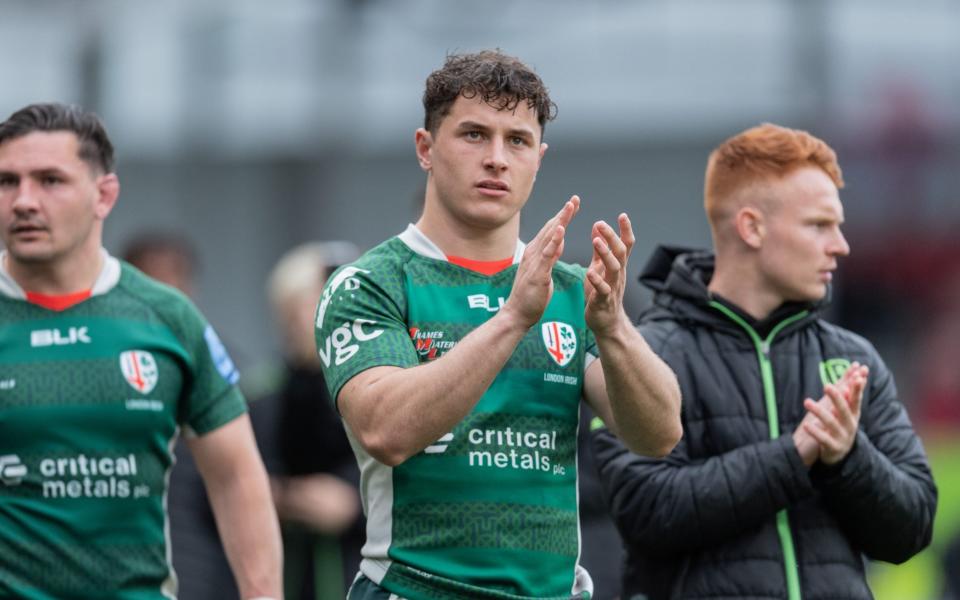London Irish’s new dawn has turned into a funeral procession

When London Irish confirmed their move from the unloved Madejski Stadium in Reading to closer to their spiritual south-west London home in Brentford in 2018, it was heralded as a new dawn for the club.
“In moving we’re confident we’ll attract a larger supporter base to join us,” then president Mick Crossan said. “I would like to thank the London Irish Board of Directors, current and past, for their hard work in steering the realisation of the London Irish vision and securing the financial stability of the club.”
Alas, it secured neither the larger supporter base nor the financial stability that Crossan envisioned. The terms of playing at the Gtech Brentford Community Stadium were far more generous than at the Madejski, which is why they paid Reading FC to enact their break clause.
It was a better location, the most accessible of any Premiership club, with great facilities, but as tenants Irish were always going to remain vulnerable to any financial crosswinds.
Which is exactly what happened when the Covid-19 pandemic hit, forcing the club to play matches behind closed doors at their shiny new stadium while paying prohibitive rent. Remarkably, Irish were operating one of the Premiership’s largest wage bills at the time accounting for marquee players and credits.
Adam Coleman, a decent but by no means remarkable Australian second row, joined the club on a reported £900,000, making him one of the entire league’s highest paid players.
It was a largesse that even Crossan, whose fortune has been estimated at around £50 million after founding Powerday, the waste and recycling management company, was struggling to afford. Last summer as it became increasingly clear that simultaneous crises were unfolding at Worcester Warriors and Wasps, whispers also started growing around Irish’s future.

This was confirmed when Crossan gave an interview to the Mail on Sunday in which he confirmed he was not just looking to sell the club but was prepared to give it away for free. “If anyone’s looking to buy a rugby club with its own training ground and P shares then they don’t even have to buy it,” Crossan said. “For me, at my age, it’s most probably the right time for me to say that I’ve done what I set out to do. I think I’ve done my bit. The club is on a good footing, with a great academy.”
Other owners within the Premiership had valued their ‘P’ shares, which entitles a club to the central income from the Rugby Football Union and broadcasting funding, at around £20 million.
Their 63-acre training complex in Hazelwood, just around the corner from their charming old Sunbury training ground, is as high class as any in the Premiership and frequently hosted NFL teams visiting for the London games.
Yet what should have been the deal of the century did not attract a stampede of prospective buyers. The club were loaded with £30 million of debt without the fixed asset of a stadium to compensate.
This is where the American consortium emerged as potential white knights. Details were – and still remain – incredibly sketchy. Howard Thomas, a former chief executive of Premiership Rugby, appears to have made the initial approach; listed as the managing director of Redstrike which claims to have expertise in rugby’s development markets.
Redstrike have links to 777 Partners, an American private equity group recently linked with a takeover of Everton FC.
Yet Thomas appeared to be acting for another American consortium which Telegraph Sport revealed was headed by Alfred ‘Chip’ Sloan, a former sports agent and lawyer. Sloan had previously inquired about buying into Saracens but was quickly rebuffed by the club. Simon Massie-Taylor, the chief executive of Premiership Rugby, even hailed the American interest as a “positive news story”.
Discussions started around the turn of the year but at nearly every turn the consortium failed to make good on its pledges with the RFU Club Financial Viability Group, which has to approve any takeover, waiting in vain for the most basic of documentation.
At the same time, it became known that Crossan was only willing to fund Irish through March. The club were four days late paying the players their April payroll, although they sought to explain this delay with the ‘cheque’s in the post’ excuse of the Bank Holiday.
The squad, who were prepared to hand in breach-of-contract letters, played their final match of the season against Exeter Chiefs and finished fifth in the league, their highest position in 14 years. It is a testament to the coaching ability of Declan Kidney and the resilience of the squad that they were able to perform so consistently with so much uncertainty in the background.

A bigger battle remained. Tired of the incessant delays and fearful of the saga dragging into the summer, the RFU set a deadline of May 30 for the takeover to be completed. This deadline was moved 24 hours and then, after Crossan agreed to pay 50 per cent of the May payroll, another week – to Tuesday June 6. An internal email sent to the players stated that the remainder would be paid “immediately (once) the funds drop in from the Americans, which is expected imminently”.
Yet on Tuesday, Crossan and the Americans, however serious their actual intentions, ran out of road for their can-kicking exercise.
Irish’s bright new dawn has now turned to darkness.

 Yahoo Sports
Yahoo Sports 